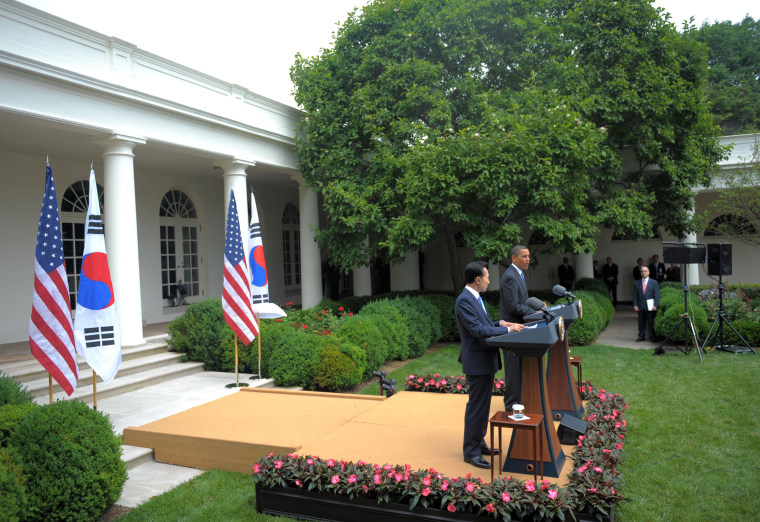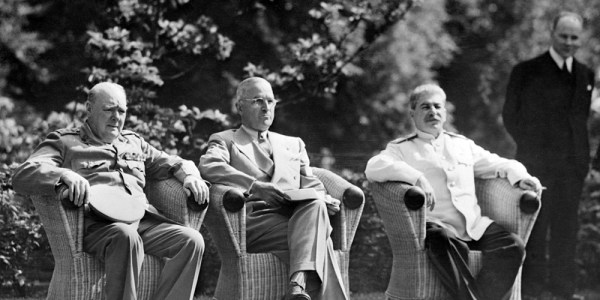President Barack Obama said Tuesday that North Korea's nuclear ambitions pose a "grave threat" to the world, and he vowed to end a cycle of allowing Pyongyang to create crises and then be rewarded with incentives to back down.
"This is a pattern they've come to expect," Obama said. "We are going to break that pattern."
Obama and South Korean President Lee Myung-bak, speaking to reporters in the White House Rose Garden, sought to portray a unified stance in dealing with North Korea's recent missile and nuclear tests and its threats of nuclear war in retaliation to sanctions from the United Nations.
Obama said the leaders agreed that the new U.N. resolution seeking to halt North Korea's development of nuclear weapons and ballistic missiles must be fully enforced. The U.N. did not authorize military force to enforce the measures.
Lee said he and Obama agreed that "under no circumstance are we going to allow North Korea to possess nuclear weapons." The communist-led North already has tested two underground nuclear devices and is believed by U.S. intelligence to possess enough material to make several nuclear bombs.
U.S. officials have said the North Koreans appear to be making preparations for a third nuclear test. North Korea also has said it would regard efforts to enforce U.N. sanctions as an act of war.
Threat of attack?
Asked by a reporter whether he believes his country is under threat of attack from the North, Lee said, "They will think twice about taking any measures that they will regret. North Korea may wish to do so, but of course they will not be able to" because of the strong U.S.-South Korean alliance.
Obama said that North Korea's record of threatening other countries and spreading nuclear technology around the world means it should not be recognized as a legitimate nuclear power. North Korea has bargained with other countries for more than a decade about giving up its nuclear program, gaining such concessions as energy and economic aid, and then backing away from its commitments.
"We will pursue denuclearization on the Korean peninsula vigorously," Obama said. "So we have not come to a conclusion that North Korea will or should be a nuclear power. Given their past behavior, given the belligerent manner in which they are constantly threatening their neighbors, I don't think there's any question that that would be a destabilizing situation that would be a profound threat, not only to United States' security but to world security."
Nor will the international community respond to North Korean provocations, such as additional underground nuclear tests, by offering financial incentives, Lee said.
"They will not be able to gain compensation by provoking a crisis," he said. "This has been a pattern in the past but it will no longer be."
Missiles in three years
On Capitol Hill on Tuesday, Pentagon officials told a Senate committee that North Korea could build missiles that could hit the United States in as few as three years if the North continued progress on its weapons system.
Lee said that his country, along with the United States, Japan, China and Russia, will discuss new measures designed to compel the North to "irrevocably dismantle all of their nuclear weapons programs." North Korea earlier this year announced that it would no longer hold talks with those five nations.
Last week, the youngest son — and reportedly heir apparent — of North Korea's ailing leader Kim Jong Il secretly visited China and was urged by President Hu Jintao to have the North halt additional nuclear tests, a top Japanese newspaper said Tuesday.
Obama said it remains possible for North Korea to take a new path, one that could lead it away from international condemnation and toward a more prosperous future.
"Prestige and security and prosperity are not going to come through the path of threatening neighbors and engaging in violations of international law," he said.
Trade agreement
Lee and Obama also addressed an ambitious South Korean-U.S. free trade agreement to slash tariffs on goods and services.
The deal was painstakingly negotiated but currently is in limbo, stalled over U.S. lawmakers' worries it could hurt an already suffering American auto industry.
Obama said he wanted to make sure differences over autos are settled before the free trade deal is sent to Congress for ratification.
He said "questions about whether there's sufficient reciprocity with respect to cars" should be worked through "in a systematic way."
"What I've done is to affirm to President Lee that we want to work constructively with the Republic of Korea in a systematic way to clear some of these barriers that are preventing free trade from occurring between our two countries," Obama said.
The agreement signed in 2007 has been promoted as a potential $10 billion boon to the U.S. economy. Failure, supporters say, would threaten U.S. standing in an important region.

